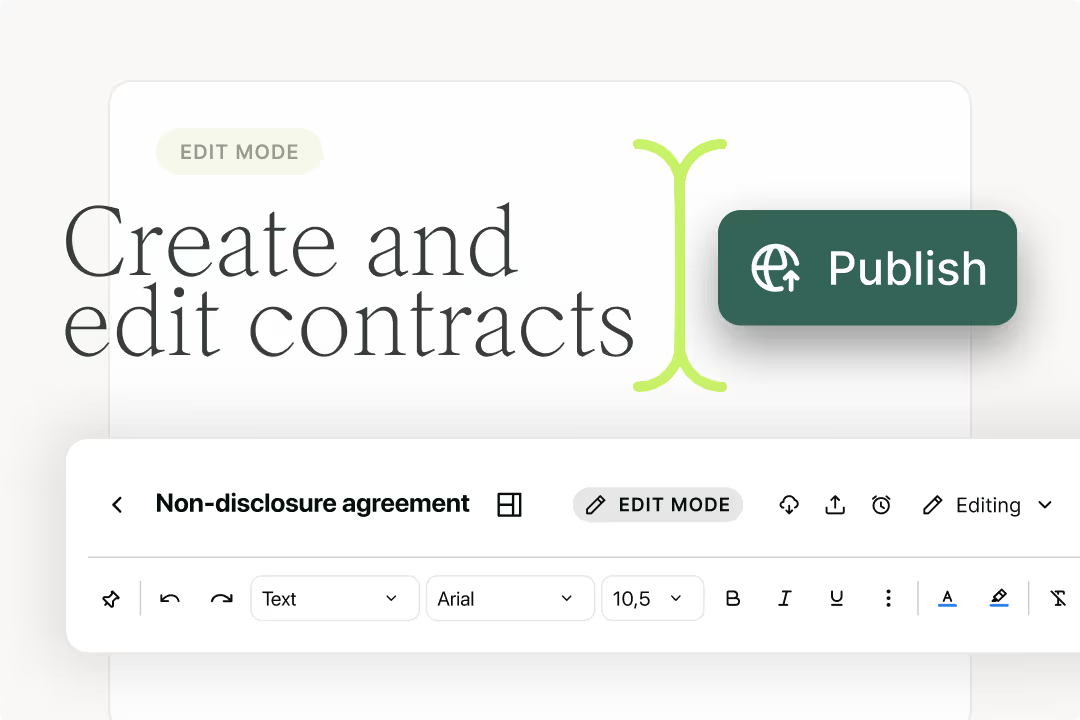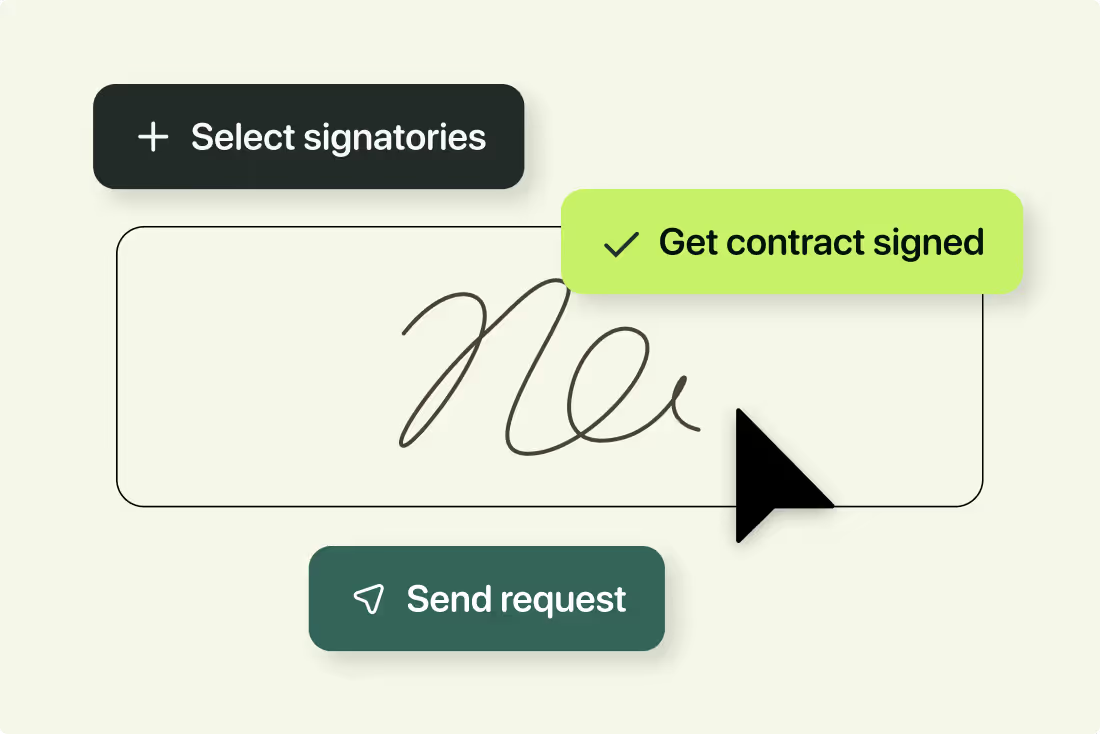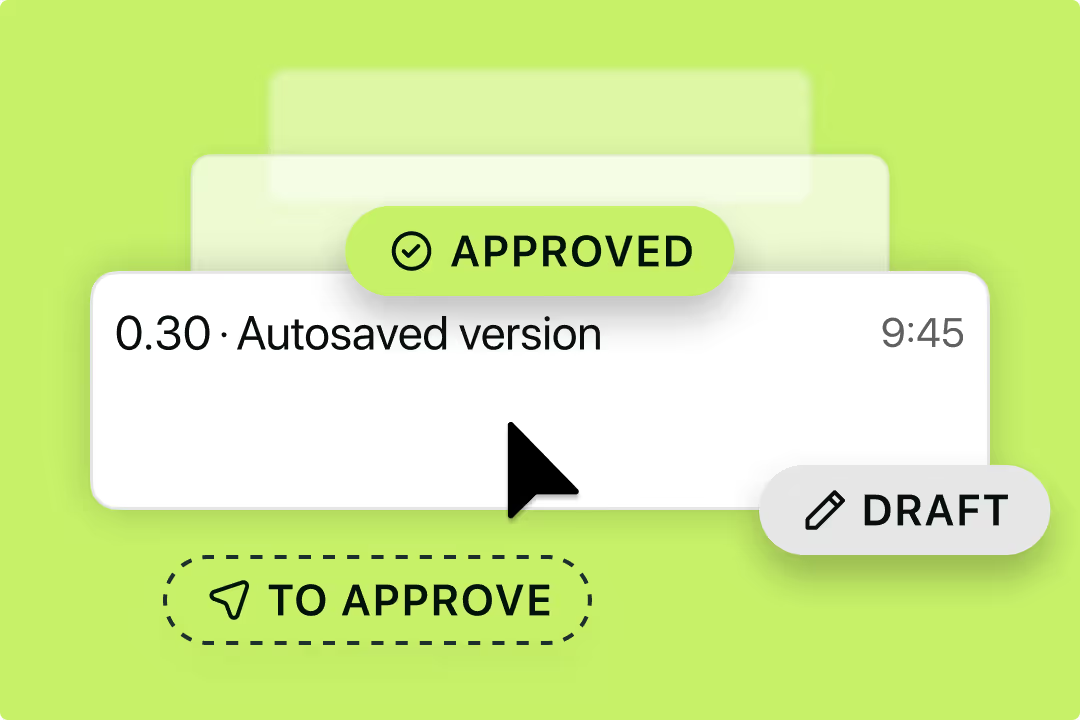Solutions
Customer Support
Resources
Contract administration is often confused with contract management, but it actually represents a different phase of the contract management workflow.
So what is contract administration, how does it differ from contract management and how can businesses make the process more efficient? Find out about the definition of contract administration, the challenges contract administrators face, and how to solve them in this article.
Contract administration is the process of planning, preparing, organizing, and executing a contract in the run-up to it getting signed.
It involves understanding the core objectives of the business contract, outlining the scope of the project, and establishing what each party's obligations ought to be for the best results.
It also encompasses other tasks, like preparing contract schedules, embedding contract renewal clauses, and seeking potential vendors to work with.
At a broader level, it can involve deciding what the actual terms of a contract should be and using this understanding to draft the final agreement.

The biggest difference between contract management and contract administration is that contract management describes the organization of the entire contract lifecycle, whereas contract administration focuses solely on the preparation and organization of a contract before it’s been signed.
This means that, although the terms contract management and contract administration are often used interchangeably, they’re two distinct processes.
For example, a contract manager will often be responsible for ensuring that contracts move smoothly through the contract lifecycle, from drafting a contract to monitoring the progress of a contract post-signature.
On the other hand, a contract administrator will be responsible for tasks like understanding what each contract stakeholder wants from an agreement, setting the optimal duration of a contract, and setting out the scope of a project, among other things.
It’s worth noting that in smaller organizations, it’s common for contract management and contract administration tasks to be undertaken by the same person. However, as your business begins to scale, it can be hard to balance contract admin tasks with other contract management responsibilities, particularly without robust contract tools in place to automate mundane administrative tasks.
Usually, a contract administrator is responsible for contract administration tasks. This will vary depending on the size of the business and their headcount. For instance, in smaller businesses, contract administration tasks might be undertaken by contract managers instead, or potentially even by commercial teams that have been enabled to self-serve on contracts.
More often than not, the burden of contract admin falls on legal teams, who are already buried in low-value work.
If this sounds like something you can relate to, and you're interested in reducing the time you spend on contract admin by up to 70 per cent, hit the button below. To find out more about contract administration challenges and best practices first, keep reading.


Contract admin tasks can be a drain on legal’s time, making it difficult to focus on higher-value work. When in-house legal teams with a low headcount are forced to dedicate time to drafting and negotiating standard contracts, the contract workflow can quickly become inefficient.
Sales teams want contracts turned around faster, finance teams want to be able to project revenue faster and legal can become a blocker to this, rather than an enabler.
Legal can set the team up to succeed by empowering business teams to self-serve on contracts, making it easier to scale legal work. Using a contract management system will allow you to set up a self-serve contract workflow.
This means that commercial teams can create contracts themselves with ease using contract templates, and negotiate conditions under pre-approved terms, freeing up legal time for higher-value tasks.
As ANC, the New York-based technology company highlighted:
{{quote1}}
Another challenge facing contract administrators is the lack of effective collaboration, especially when it comes to contracts that affect different stakeholders within the company.
Since contracts are typically created in Word, which doesn’t offer the collaborative features businesses need to collaborate on agreements, legal typically work in silos on contracts. The danger of this is that commercial teams’ concerns and requests can often go unheard or unmet, as they’re often not involved in the contracts that affect them most.
That’s why businesses need to consider a more collaborative approach to managing contracts. For example, Juro allows contract owners to add different parties to a contract and negotiate terms both internally and externally.
Features such as permission controls and sequential approval workflows enable business departments to collaborate seamlessly on contracts in one place, and in real-time.
Contract drafting is a manual process for most businesses. Contracts are often drafted by copying and pasting from existing Word documents or written from scratch. This is time-consuming and can result in deviations from established terms, inconsistent wording, and multiple versions of the same contract floating around.
These deviations can add risks to your business relationship and cause misunderstandings about the terms at hand - two things that creating a contract is designed to prevent! Implementing contract lifecycle management software allows you to create contracts in a more standardized way and avoid unnecessary contract risk.

Contract administration helps to ensure that contracts are reviewed and approved, but it doesn’t help with the signing process.
This is usually because there is no unified process for signing contracts. For some businesses, signing a contract means emailing it back and forth, saving it as a PDF, printing it off, signing it in wet ink, scanning it, and emailing it back to the counterpart while others will have some form of eSignature available.
However, even if the business has modernized this process, it typically involves a third-party eSignature tool that’s separate from the method used to create and edit contracts.
This can create even more hassle, as it requires users to move to yet another platform before they can sign. Switching between these many platforms can create friction and delays in getting contracts over the line.
That’s why many businesses are now opting to use a more sophisticated solution with built-in eSignature capabilities, like Juro, to manage their contracts.

Contract administration is hard enough without having to manage multiple different versions of the same contract. A contract workflow that relies on multiple different systems means you end up with different copies of a contract in different formats. This leaves contract administrators unsure of which contract version is the most recent one, and where to find it.
Fortunately, this process can be simplified by implementing an all-in-one contract tool that enables you to manage contract administration in one platform - Juro is the best example of this.
When using Juro, contract owners, and administrators don’t need to create parallel versions of the same contract or store these versions across shared drives.
Instead, Juro users can create a single version of a contract and invite other users to collaborate on the contract in real-time. Juro’s browser-based contract software also creates a detailed audit trail that tells users when contracts were last seen, edited, and signed.

How long until the contract gets signed? Has it been reviewed yet? What’s holding the contract up? Where can I find a copy of the agreement?
These are questions that contract administrators are all too familiar with.
As the point of contact for contracts up until they’ve been signed, contract administrators are often bombarded with questions relating to the specific terms of a contract, the estimated timelines, and the contract’s progress.
But what if all of this information could be made readily available to the relevant parties? What if sales could check the progress of a contract in real-time? What if HR teams could negotiate the terms of an employment contract directly to ensure the hiring process doesn’t lose momentum?
When businesses implement contract management software, all of this information is stored in one centralized database. This improves contract visibility and ensures that all of the contract stakeholders have access to the relevant legal documents.
One of the best ways to make contract administration more efficient is to enable commercial teams to self-serve on simple contracts. This means that business teams no longer have to wait around for legal teams to answer queries, action changes, and progress contracts. Instead, they can create, review, negotiate, and sign contracts themselves with no blockers.
{{quote2}}
Automating manual contract administration can also prove beneficial to the later stages of contract management. For instance, by automating your contracts in Juro, you’re creating your contracts as structured data from the offset.
This then enables Juro to quickly and seamlessly extract contract data, which can be used to inform strategy and ensure contract compliance, without the need to extract and record all of the data manually.
{{quote3}}
Enabling business teams to self-serve on contracts doesn’t mean that legal loses control.
When companies implement software like Juro, legal teams can bake fallback clauses into contracts, set up conditional approvers, and use automated templates to ensure only pre-approved language is used in legal agreements.
By setting up these conditions using conditional logic and creating robust approval workflows, business teams can speed up contract administration without adding risk to new commercial relationships.
{{quote4}}
Another contract management best practice is to implement a platform that enables better contract collaboration and makes contract negotiation easier.
Contrary to the experience that legal and business teams have redlining contracts in Google Docs or Microsoft Word, contract automation makes contract collaboration seamless. Parties can:
Tag team members, leave comments, and collaborate on contracts in real-time using Juro
When moving forward with a new, more efficient contract administration process, it’s important to communicate this process effectively with your teams.
For instance, you need to make the following things clear:
This is typically achieved by creating a detailed contract playbook, or better, by automating these processes and workflows using a tool like Juro.
{{quote5}}
Juro is the only platform that truly enables you to process contracts end-to-end with one solution, reducing friction and removing bottlenecks from your contract workflow.
Juro users typically win back 70 per cent of time spent on contract admin. Book a demo below to join them.
Lorem ipsum dolor sit amet, consectetur adipiscing elit. Suspendisse varius enim in eros elementum tristique. Duis cursus, mi quis viverra ornare, eros dolor interdum nulla, ut commodo diam libero vitae erat. Aenean faucibus nibh et justo cursus id rutrum lorem imperdiet. Nunc ut sem vitae risus tristique posuere.

